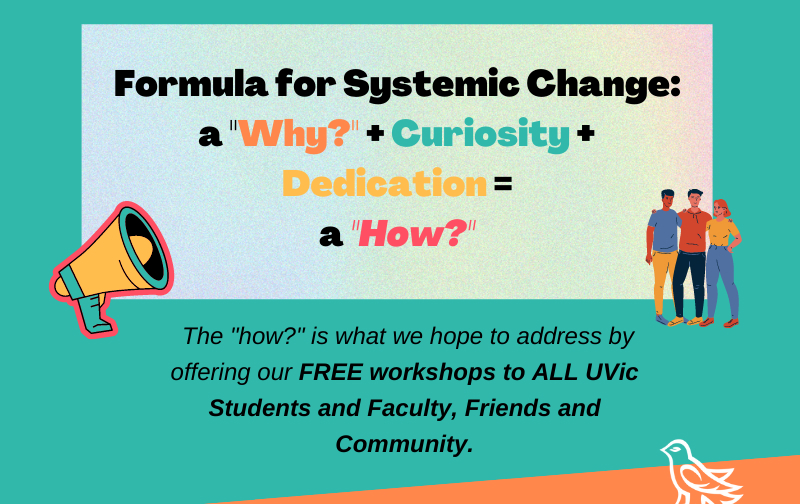The UVic Ed SEA is running a series of workshops on inclusivity, here’s the education you’ve been missing out on

It takes a lot to make me feel uncomfortable, but being made aware of my privilege in society will certainly do the trick.
After hearing positive reviews of the UVic Ed Student Equity Advocates workshops, I signed up. On Feb. 9, I logged in and took part in the fourth workshop, “Inclusivity and Diversity Part 2: Doing the work.” Since I hadn’t attended part one, I was uncertain as to how much information I would be missing, but decided that one workshop was better than none.
UVic Ed SEA has been putting on workshops this winter with the goal of increasing education and discourse among students on the subjects of inclusivity and equality. Workshop on subjects like land acknowledgements and getting comfortable with being uncomfortable took place earlier this season as part of the five-part series of online events. The events are free for students to attend, and can be accessed as part of a mailing list through the UVic SEA.
The UVic SEA states to be “committed to creating widespread, long-lasting change in our communities for those affected by systemic oppression and discrimination.”
Upon logging into the Zoom, I immediately noticed the small number of participants. It felt unsetting to me to know that this event, which had been advertised on several UVic-related Instagram accounts and also on the UVic website, had only twenty people in attendance, four of whom were the facilitators.
I also noticed that, while most people had their pronouns listed in their Zoom names, almost all used “she/her” pronouns. Not a single participant specified using “he/him” as their pronouns, which stood out to me.
The event began with a territory and land acknowledgement. The lead facilitator of the event, launched into an explanation that this workshop was going to be about learning to do the necessary work to progress towards inclusivity.
The facilitators of the event, four self-identifying women who are students at UVic, were friendly and open and encouraged open conversation. The lead facilitator expressed apologies for using an outdated term in the last workshop, which made the environment feel welcoming.
I felt like I could have spoken up if I had a question without fear of making a mistake. It quickly became clear that learning was part of the process, and it was okay to ask questions.
The framework was simple: they had developed an acronym as a seven-step guide to tackling unconscious bias. AOQEEEC. It might not roll off the tongue, but the deeper meaning is pretty valuable: Acknowledge, Observe, Question, Empathize, Educate, Engage, and Commit. With deep dives into what each step means in relation to unconscious bias, we underwent a crash-course in finding an understanding of what it means to strive for inclusivity.
The workshop included interactive exercises to put the knowledge we were learning into practice. Activities encouraged anonymous dialogue that was shared with the group, as well as self-reflection activities that were kept to ourselves.
The software Padlet was used as an anonymous way of responding to questions and sharing our thoughts about various subjects such as what empathy means to us, and the ways unconscious bias can manifest.
After an hour and 18 minutes, I was feeling more aware of my position in society and more conscious of my privilege than I had in a really long time. The presenters kept thanking us for being there, but all I could think about was how undeserving I felt of being thanked. I felt like I had done the bare minimum in attending a curated workshop that was offered to me to provide me with resources and information to further my education on the subject.
The final interactive activity of the workshop called upon us all to introduce ourselves from an intersectional perspective, which felt safe and intimate in the small group setting.
So hi, I’m Hana. I’m a white, middle-class, able-bodied, self-identifying woman pursuing a post-secondary education. And that means I have a lot of privileges that not everyone has. And it’s not a bad thing to be reminded of that.
The UVic Ed SEA can be contacted at uvicedsea@uvic.ca for future workshops and education opportunities.






